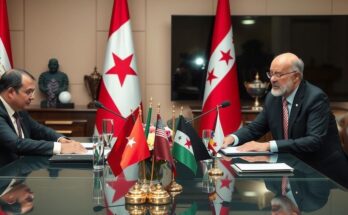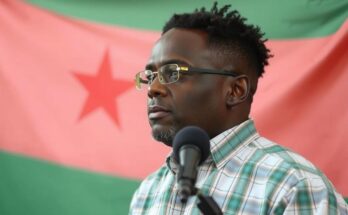The conflict between Israel and Hezbollah has led to significant casualties and displacement in Lebanon, with UN reports indicating a quarter of the country under evacuation orders. Hezbollah’s deputy leader, Naim Qassem, addressed the situation, expressing defiance but also support for ceasefire efforts, without preconditions linked to the Gaza conflict. The group’s weakened state has led to questions about its future and the likelihood of a ceasefire, with Israeli officials indicating a continued offensive strategy.
The ongoing conflict between Israel and Hezbollah has reached critical levels, with the United Nations reporting that a quarter of Lebanon is under evacuation orders as the fighting persists. Naim Qassem, the deputy head of Hezbollah, has emerged in a recent televised address, marking a year since the group’s rocket attacks against Israel began. This presentation, conducted from an undisclosed location, was characterized by defiance; however, Qassem’s remarks also hinted at a potential shift in Hezbollah’s stance on ceasefire negotiations. Notably, he expressed support for efforts led by the Speaker of the Lebanese Parliament, a Hezbollah ally, to secure a cessation of hostilities, without indicating that a halt in the Gaza conflict was a prerequisite. Despite this potential opening, it remains uncertain whether Hezbollah’s position has genuinely evolved, particularly as the organization has suffered significant losses, with vast infrastructural damage and the elimination of many key leaders. The humanitarian toll has been severe, with over 2,000 fatalities reported in Lebanon and approximately 1.2 million individuals displaced from their homes. Currently, the Israeli perspective suggests little motivation for a ceasefire; military officials indicate that the operations against Hezbollah have been effective, and there is a prevailing sentiment that the offensive should continue rather than cease.
The situation in Lebanon is tightly interwoven with the broader context of the Israeli-Palestinian conflict. Hezbollah, a militant group and political party in Lebanon, has engaged in armed resistance purportedly in solidarity with the Palestinians, particularly during escalations of violence involving Israel. The enduring conflict has exacerbated existing instability in Lebanon, a country already grappling with economic crises and political disarray. The ongoing warfare has raised humanitarian concerns, leading to mass evacuations and significant civilian casualties, while the conflict dynamics continue to evolve based on both local and international influences. Recent developments have intensified discourse regarding the potential for ceasefire and negotiations, raising questions about the future role of Hezbollah in Lebanon and its relationship with Israel.
In summary, the conflict between Israel and Hezbollah remains intense, with the latter facing unprecedented challenges. The remarks by Naim Qassem suggest a possible openness to ceasefire discussions; however, the absence of preconditions regarding Gaza is notable. The humanitarian crisis continues to escalate, with a considerable number of casualties and displaced individuals in Lebanon. As Israeli military operations reportedly succeed in weakening Hezbollah, the potential for immediate cessation of hostilities appears limited. Overall, the situation remains fragile, with significant implications for regional stability.
Original Source: www.bbc.com




